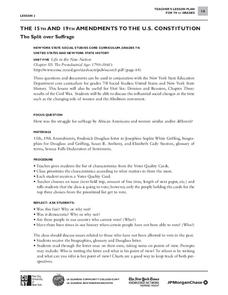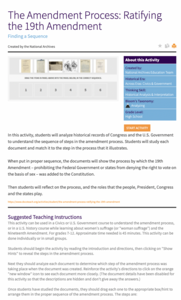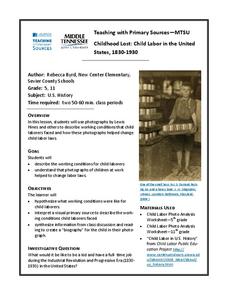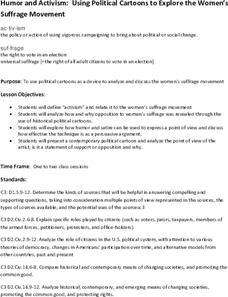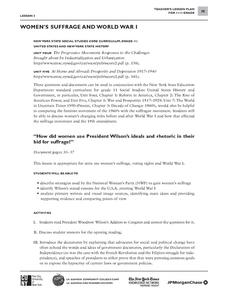PBS
19th Amendment to the U.S. Constitution - Women's Right to Vote (1920) and Resource Materials
A facsimile of the 19th Amendment, a transcript of the amendment, a photograph of a suffragist march, and a background information sheet that details the struggle to get the amendment passed comprise a packet of resource materials...
City University of New York
The 15th and 19th Amendments to the U.S. Constitution
Who gets to vote? Learn more about struggles for suffrage throughout United States history with a lesson based on primary source documents. Middle schoolers debate the importance of women's suffrage and African American suffrage before...
National Endowment for the Humanities
Cultural Change
High schoolers research the passage of the 19th Amendment as an illustration of the mutual influence between political ideas and cultural attitudes. They also read the Seneca Falls Declaration and explore the cultural shifts it both...
DocsTeach
The Amendment Process: Ratifying the 19th Amendment
The process for adding an amendment to the U.S. Constitution is long and arduous, by design. High School historians study a series of documents about the Nineteenth Amendment and, using an interactive program, drag the documents onto a...
National Woman's History Museum
19th Amendment
As part of a study of the women's suffrage movement and the ratification of the Nineteenth Amendment, young historians examine documents that detail when voting rights were granted to women in various countries and when US states...
Alabama Department of Archives and History
What Were They Thinking? Why Some Some Alabamians Opposed the 19th Amendment
To better understand the debate over the 19th Amendment, class members examine two primary source documents that reveal some of the social, economic, racial, and political realities of the time period.
Curated OER
Constitutional Amendments and Gay Marriage
High schoolers study the legal battles involving same-sex marriage. They examine primary sources and a video regarding the 14th amendment and its implications for gay marriage. They analyze a report of a California case that was sent to...
National Woman's History Museum
The Equal Rights Amendment
The debate over the Equal Rights Amendment continues. To better understand the controversy, class members research the history of attempts to get the amendment ratified. In addition, pairs engage in a structured academic conversation...
PBS
Elizabeth Cady Stanton: Orator, Author, and Activist
Have you ever felt like your opinion doesn't count? Scholars research and analyze the impact Elizabeth Cady Stanton had on women's rights. Primary and secondary sources as well as video clips give individuals a clear picture of Stanton's...
Curated OER
Qualifying to Vote Under Jim Crow
Literacy tests, poll taxes, grandfather laws? Scholars study the systematic ways African-Americans were kept from voting even after it was made a law. They analyze a series of primary source documents, complete a worksheet, and engaged...
National Woman's History Museum
The Road to Suffrage
Scholars each research a different entry on the included suffrage timeline that lead to the ratification of the 19th Amendment. Using a minimum of three sources, investigators add what they have learned to a combined class Suffrage...
Alabama Department of Archives and History
Voting Rights for Alabama Women
What were the arguments put forth by those who opposed the 19th Amendment? For those in favor? Class members examine primary source materials that illustrate the intense debate in Alabama about women's suffrage.
Curated OER
Women’s Suffrage
Students examine several aspects of the Women's Suffrage Movement. In this women's rights lesson, students explore several primary and secondary sources regarding the events of the movement, opposition to the movement, and the effects of...
Curated OER
Social Movements and Constitutional Change: Women's Suffrage
The class analyzes a series of documents intended to show the events that lead to women gaining the right to vote. They play a Tic-Tac-Toe style game, make a time line with sequencing cards, and review the 4 steps of social change....
James Madison Memorial Fellowship Foundation
Those "Other Rights:" The Constitution and Slavery
Did the United States Constitution uphold the institution of slavery, or did it help to destroy it? Young historians study Article 4, Section 2, Clause 3 of the Constitution and evaluate the rights of slaveowners as they compared to or...
Center for History and New Media
A Look at Virginians During Reconstruction, 1865-1877
The transition between rebellion to reunification was not smooth after the Civil War. Young historians compare primary and secondary source documents in a study of the Reconstruction era in Virginia, noting the rights that were not...
Curated OER
Childhood Lost: Child Labor in the United States, 1830-1930
Working in groups, middle and high schoolers describe and discuss photographs depicting working conditions experienced by child laborers in the 19th century. They then write a persuasive paragraph supporting an amendment to regulate the...
NYC Department of Records
Citizenship and Elections: The Importance of a Ballot
Approximately 58 prcent of those eligible voted in the 2016 US Presidential election. In an attempt to impress upon learners the importance of voting and voting rights, class members examine primary source documents related to the...
Curated OER
The Women's Suffrage Movement Signature Debacle
Students examine the Women's Suffrage Movement in Nebraska. In this women's rights lesson, students explore primary and secondary sources regarding suffrage in the state and obstacles that women in the state faced when it came to casting...
National Woman's History Museum
Humor and Activism
As part of their study of the women's suffrage movement, groups analyze political cartoons and drawings. They create a caption for an image from the time, add an exhibit label that provides a context for their drawing, and post as part...
National History Day
Challenging the Status Quo: Women in the World War I Military
Why are some so resistant to change? The status quo is often to blame for a lack of forward movement in society. Following the events of World War I, women in America suddenly had a voice—and were going to use it. Scholars use the second...
City University of New York
Woman's Suffrage and World War I
How did women use President Wilson's ideals and rhetoric in their bid for suffrage? To answer this essential question, class groups analyze primary written documents and visual images.
Tennessee State Museum
Understanding Women’s Suffrage: Tennessee’s Perfect 36
Tennessee was the pivotal state in ratifying women's suffrage in 1920, with its vote coming down to one man: Harry Burn, a 24-year old state representative who changed his nay to an aye on the advice of his mother. Learn more about...
Stanford University
Prohibition
Prohibition banned the selling of alcohol in America—but why? Designed for high school pupils, the lesson explores the causes of Prohibition including the Temperance Movement. The lesson pairs a PowerPoint presentation with worksheets...



